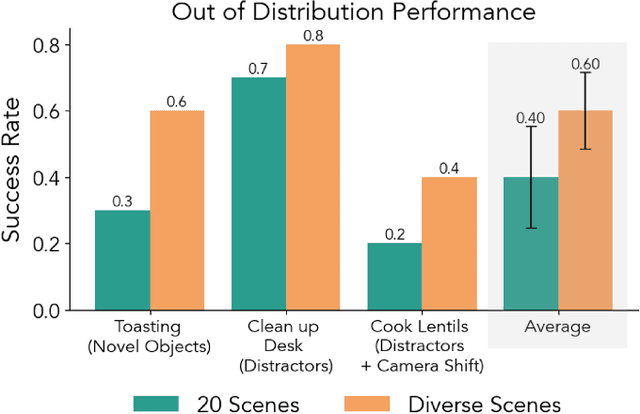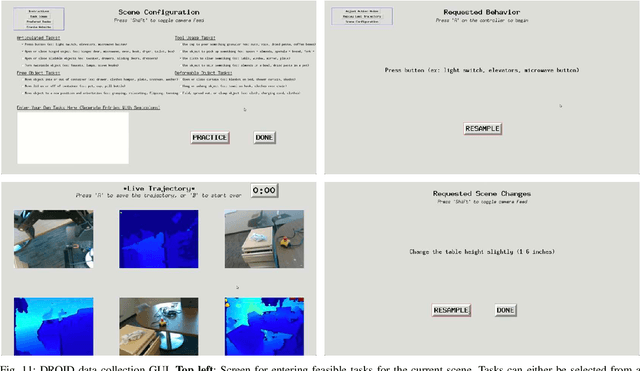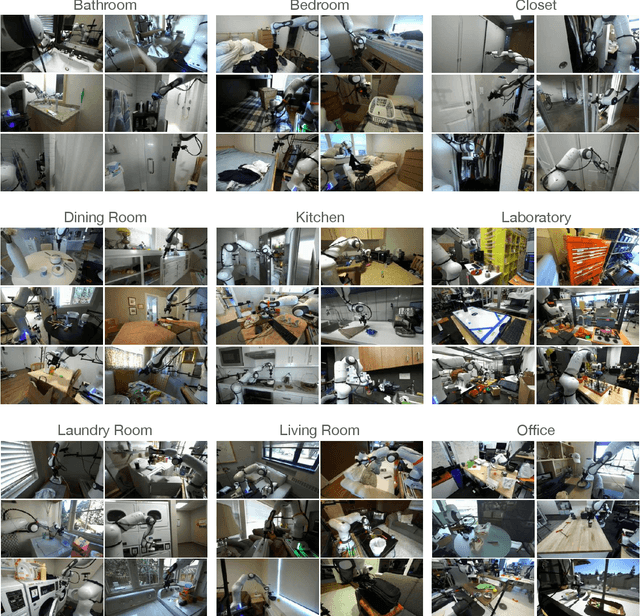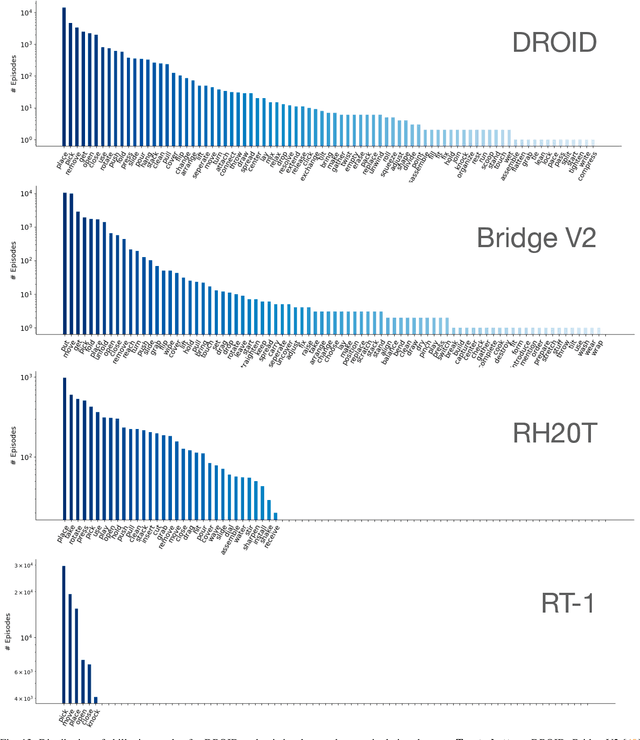Abhiram Maddukuri
Sim-and-Real Co-Training: A Simple Recipe for Vision-Based Robotic Manipulation
Mar 31, 2025Abstract:Large real-world robot datasets hold great potential to train generalist robot models, but scaling real-world human data collection is time-consuming and resource-intensive. Simulation has great potential in supplementing large-scale data, especially with recent advances in generative AI and automated data generation tools that enable scalable creation of robot behavior datasets. However, training a policy solely in simulation and transferring it to the real world often demands substantial human effort to bridge the reality gap. A compelling alternative is to co-train the policy on a mixture of simulation and real-world datasets. Preliminary studies have recently shown this strategy to substantially improve the performance of a policy over one trained on a limited amount of real-world data. Nonetheless, the community lacks a systematic understanding of sim-and-real co-training and what it takes to reap the benefits of simulation data for real-robot learning. This work presents a simple yet effective recipe for utilizing simulation data to solve vision-based robotic manipulation tasks. We derive this recipe from comprehensive experiments that validate the co-training strategy on various simulation and real-world datasets. Using two domains--a robot arm and a humanoid--across diverse tasks, we demonstrate that simulation data can enhance real-world task performance by an average of 38%, even with notable differences between the simulation and real-world data. Videos and additional results can be found at https://co-training.github.io/
Reinforcement Learning for Dynamic Memory Allocation
Oct 20, 2024


Abstract:In recent years, reinforcement learning (RL) has gained popularity and has been applied to a wide range of tasks. One such popular domain where RL has been effective is resource management problems in systems. We look to extend work on RL for resource management problems by considering the novel domain of dynamic memory allocation management. We consider dynamic memory allocation to be a suitable domain for RL since current algorithms like first-fit, best-fit, and worst-fit can fail to adapt to changing conditions and can lead to fragmentation and suboptimal efficiency. In this paper, we present a framework in which an RL agent continuously learns from interactions with the system to improve memory management tactics. We evaluate our approach through various experiments using high-level and low-level action spaces and examine different memory allocation patterns. Our results show that RL can successfully train agents that can match and surpass traditional allocation strategies, particularly in environments characterized by adversarial request patterns. We also explore the potential of history-aware policies that leverage previous allocation requests to enhance the allocator's ability to handle complex request patterns. Overall, we find that RL offers a promising avenue for developing more adaptive and efficient memory allocation strategies, potentially overcoming limitations of hardcoded allocation algorithms.
RoboCasa: Large-Scale Simulation of Everyday Tasks for Generalist Robots
Jun 04, 2024Abstract:Recent advancements in Artificial Intelligence (AI) have largely been propelled by scaling. In Robotics, scaling is hindered by the lack of access to massive robot datasets. We advocate using realistic physical simulation as a means to scale environments, tasks, and datasets for robot learning methods. We present RoboCasa, a large-scale simulation framework for training generalist robots in everyday environments. RoboCasa features realistic and diverse scenes focusing on kitchen environments. We provide thousands of 3D assets across over 150 object categories and dozens of interactable furniture and appliances. We enrich the realism and diversity of our simulation with generative AI tools, such as object assets from text-to-3D models and environment textures from text-to-image models. We design a set of 100 tasks for systematic evaluation, including composite tasks generated by the guidance of large language models. To facilitate learning, we provide high-quality human demonstrations and integrate automated trajectory generation methods to substantially enlarge our datasets with minimal human burden. Our experiments show a clear scaling trend in using synthetically generated robot data for large-scale imitation learning and show great promise in harnessing simulation data in real-world tasks. Videos and open-source code are available at https://robocasa.ai/
DROID: A Large-Scale In-The-Wild Robot Manipulation Dataset
Mar 19, 2024



Abstract:The creation of large, diverse, high-quality robot manipulation datasets is an important stepping stone on the path toward more capable and robust robotic manipulation policies. However, creating such datasets is challenging: collecting robot manipulation data in diverse environments poses logistical and safety challenges and requires substantial investments in hardware and human labour. As a result, even the most general robot manipulation policies today are mostly trained on data collected in a small number of environments with limited scene and task diversity. In this work, we introduce DROID (Distributed Robot Interaction Dataset), a diverse robot manipulation dataset with 76k demonstration trajectories or 350 hours of interaction data, collected across 564 scenes and 84 tasks by 50 data collectors in North America, Asia, and Europe over the course of 12 months. We demonstrate that training with DROID leads to policies with higher performance and improved generalization ability. We open source the full dataset, policy learning code, and a detailed guide for reproducing our robot hardware setup.
 Add to Chrome
Add to Chrome Add to Firefox
Add to Firefox Add to Edge
Add to Edge